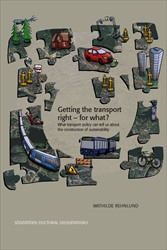“Get the transportation right. Then let things happen.”
Sir Peter Hall, Professor of Urban Planning, once gave this advice on planning cities for a sustainable future.
In research and politics, ‘right’ is increasingly coming to mean ‘sustainable.’ There is a wide consensus that transport is a crucial component of sustainability efforts, which also includes an approximate agreement about what measures make transport more sustainable. However, there is still debate on what sustainability is and what form of society it necessitates.
If policy is an expression of what is considered ‘right’, and getting the transport right will enable sustainable cities, then just what is right or sustainable in Stockholm can be read from transport policy proposals. By paying attention to what proposed measures may do, we can consider the direction of sustainability. That is, for what is transport made right?
This thesis explores the discursive construction of sustainability in policy for transport in Stockholm between 2007 and 2017. It does so by treating transport as a governing technology, and searching policy for what solutions are proposed to make transport right and what problems these imply.
Rather than asking what transport policy should do, this thesis explores the way that transport is literally and discursively constructed in policy – and to what effects.
Mathilde Rehnlund has a multidisciplinary background in environmental studies and a special interest in cities, visions for the future, and the meaning of what we do and say. Her PhD thesis in environmental studies combines these three topics.


